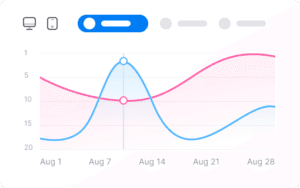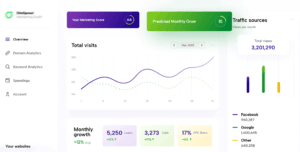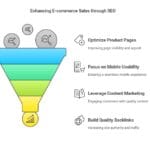
In the dynamic world of digital marketing, achieving a strong online presence is essential for businesses and content creators. Search Engine Optimization (SEO) plays a pivotal role in increasing visibility and driving organic traffic to websites. Among the many factors influencing SEO, Domain Authority (DA) stands out as a critical metric. But what exactly is Domain Authority, and how does it impact SEO? This comprehensive guide will delve into the concept of Domain Authority, its calculation, significance, and actionable strategies to improve it.
Understanding Domain Authority
Domain Authority is a metric developed by Moz, a leading SEO software company, to predict how well a website will rank on search engine results pages (SERPs). It assigns a score ranging from 1 to 100, with higher scores indicating a greater ability to rank. The metric is not used by Google itself but serves as a valuable tool for SEO professionals to evaluate and compare the ranking potential of websites.
How is Domain Authority Calculated?
Domain Authority is calculated using various factors, primarily focusing on the quantity and quality of inbound links to a website. Moz’s algorithm considers over 40 metrics, including:
- Linking Root Domains: The number of unique domains linking to your website. High-quality backlinks from authoritative sites significantly boost DA.
- MozTrust and MozRank: Metrics that evaluate the trustworthiness and popularity of your site based on its backlink profile.
- Content Quality: High-quality, relevant, and engaging content tends to attract more backlinks.
- User Experience (UX): Factors like page speed, mobile-friendliness, and site navigation indirectly influence DA by affecting user engagement and satisfaction.
The algorithm uses a logarithmic scale, meaning it’s easier to increase DA from 10 to 20 than from 70 to 80. This reflects the competitive nature of high-ranking domains.
Why is Domain Authority Important?
Domain Authority is not a direct ranking factor for Google, but it provides valuable insights into your website’s SEO performance. Here’s why it matters:
- Benchmarking Performance: DA helps you assess your website’s authority compared to competitors in your niche.
- Link Building Strategies: A high DA score makes your site more attractive to potential collaborators and link-building partners.
- SEO Campaign Effectiveness: Monitoring DA changes over time helps evaluate the success of your SEO strategies.
- Improved Rankings: Although not a direct factor, a high DA often correlates with better SERP rankings due to the strong backlink profile and high-quality content it represents.
Factors Affecting Domain Authority
Improving your Domain Authority requires a strategic approach. The following factors significantly influence DA:
1. Backlink Profile
Backlinks are the backbone of Domain Authority. Focus on:
- Quality Over Quantity: A few links from high-authority domains are more impactful than numerous links from low-quality sites.
- Relevance: Backlinks from sites within your niche or industry carry more weight.
- Diversity: A varied backlink profile, including links from blogs, news sites, and forums, enhances credibility.
2. Content Quality
Search engines prioritize websites with valuable and original content. To improve DA:
- Publish in-depth, well-researched articles.
- Use multimedia elements like images, videos, and infographics to enrich content.
- Address user intent by creating content that answers specific questions or solves problems.
3. Website Structure and UX
A well-structured website enhances usability and crawlability. Key considerations include:
- Mobile optimization for seamless browsing on all devices.
- Fast loading speeds to reduce bounce rates.
- Clear navigation to improve user experience.
4. Domain Age and History
Older domains with a clean history tend to have higher authority. Avoid practices like:
- Acquiring domains with a spammy backlink profile.
- Changing domain names frequently.
5. Social Signals
Although not a direct ranking factor, social media engagement can amplify your content’s reach and attract backlinks. Encourage sharing on platforms like Facebook, Twitter, LinkedIn, and Pinterest.
How to Improve Domain Authority
Building Domain Authority is a long-term process. Here’s a step-by-step guide to enhance your DA:
1. Audit Your Backlink Profile
- Use tools like Moz, Ahrefs, or SEMrush to analyze your backlinks.
- Disavow toxic or spammy links that may harm your DA.
- Identify and replicate competitor’s high-quality backlinks.
2. Create Link-Worthy Content
- Develop evergreen content that remains relevant over time.
- Write guest posts for high-authority websites.
- Create shareable resources, such as guides, whitepapers, and case studies.
3. Optimize On-Page SEO
- Use descriptive and keyword-rich title tags and meta descriptions.
- Structure content with proper headings (H1, H2, etc.) for better readability.
- Optimize images with alt text and appropriate file sizes.
4. Enhance Technical SEO
- Ensure your website is mobile-friendly.
- Fix broken links and redirect errors.
- Use an XML sitemap to help search engines index your pages.
5. Leverage Social Media
- Share your content regularly on social media platforms.
- Engage with your audience to build a loyal community.
- Collaborate with influencers to increase visibility.
6. Monitor and Adjust
- Regularly track your DA score using Moz’s free tools or other SEO platforms.
- Analyze your competitors to identify areas of improvement.
- Stay updated on algorithm changes and SEO trends.
Common Misconceptions About Domain Authority
Despite its importance, Domain Authority is often misunderstood. Let’s clarify some misconceptions:
- DA is a Google Metric: As mentioned earlier, Google does not use DA as a ranking factor. It’s a third-party metric developed by Moz.
- High DA Guarantees Top Rankings: While a high DA indicates strong SEO potential, other factors like content quality, keyword targeting, and user engagement also influence rankings.
- DA Can Be Increased Overnight: Building Domain Authority requires consistent effort over time. There are no shortcuts.
Conclusion
Domain Authority is a valuable metric for understanding and improving your website’s SEO performance. While it’s not a direct ranking factor, a high DA score often correlates with better visibility on search engines. By focusing on building a strong backlink profile, creating high-quality content, and optimizing technical aspects of your site, you can gradually increase your Domain Authority and improve your overall SEO strategy. Remember, achieving a high DA is a marathon, not a sprint—consistent effort and strategic planning will yield the best results over time.







